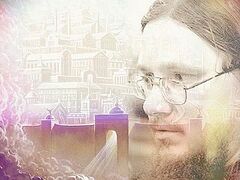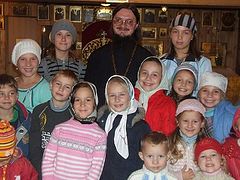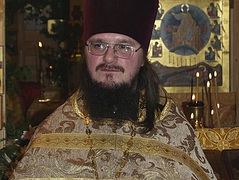Part 1. He Managed to Unite All of Moscow. Fr. Daniel Sysoev Through the Eyes of a Brother Priest.
In December 2009, just a month after the brutal slaying of the great missionary Fr. Daniel Sysoev, Moscow radio host Sergei Gerasimov dedicated an episode of his show to the martyr. Among his guests were Fr. Daniel’s brother Vasily, who offered an intimate look at him through his memories of his brother both as a child and as a tireless missionary and priest.
Sergei Gerasimov: Greetings, dear listeners. Today we have a mournful, somewhat gloomy program, but perhaps, in some sense, joyful. It is dedicated to the memory of the murdered Fr. Daniel Sysoev.
Vasily, please tell us a little about how he was at home, who he was, how you perceived him.
Vasily Sysoev: He was always, for us, a radiant person. We loved him very much, because he was a model in everything. He was the firstborn. He defined that extraordinary rhythm and that extraordinary height to which all of us in our family will strive now, because the death of a martyr is probably the very best, as he believed, for any Christian. In essence, he led his entire life like a confessor. There’s even a story from his childhood, when he was in first grade, in the Soviet Union in the 1980s, and he was put in front of the entire class, with children who were also soviets, raised in atheism. And the teacher asked: “So, what, you believe in God, and you know some prayers?” Of course, the whole class started laughing and starting shouting about how Gagarin went into space and didn’t see God there. And after a short pause, Fr. Daniel said: “Yes, I believe in God, and I know many prayers.” This was probably one of the first most striking examples of his life as a confessor, and at such a young stage of life. And the last stage, we saw literally just a few days ago—the martyric crown that he received from God.
He was always very kind and responsive and would do anything we asked of him—if it was for the good, of course. He rallied us around his parish. My older brother Pimen and I sang in his choir. Our younger brother Tikhon served in the altar with his blessing. Our younger sister also came quite often. She was still very young then, and mama didn’t let her go so far alone, but she came a lot and sang with us. He never forgot us, and always helped us when things were difficult. He baptized my son, and he served my wedding and Pimen’s wedding in his Church of the Apostle Thomas. We’ll always remember him, his wonderful smile. I can’t remember a single moment when he wasn’t smiling. He smiled and he joked. He was always happy, never sad. There was this remarkable time when he broke his leg, just two years ago, if I remember correctly. The situation was that the dean didn’t send a replacement priest to the parish. So he had to serve himself, because (inaudible) the services should never stop, that they are the foundation of the whole Christian life (inaudible). So he came out during the Great Entrance himself on this broken leg. I could see him walking with this crazy pain in his leg. He overcame it and was smiling. He read the appointed prayers and went back into the altar, where they sat him in a wheelchair, and he continued the Liturgy. This was the meaning of his life. He went through it all with a smile on his lips.
Sergei Gerasimov: It was still soviet times when your parents came to the faith. And you were born in an already-believing family?
Vasily Sysoev: Fr. Daniel was born before our parents were baptized. They were baptized together in 1979. Of course, Fr. Daniel couldn’t simply just get baptized. From childhood, he was distinguished by the gift of a certain mysticism from God. During his Baptism, he saw an angel. And he testified of this to our parents immediately, when they were going around the font and he asked them: “Do you see him?” Of course, our parents said they didn’t see anything. He told me about it many times in private conversations, how he saw some man in fiery clothing, standing next to the font. And after their Baptisms, our family began to be educated in Christianity. So, yes, Pimen and I were born in an already Orthodox family, but Fr. Daniel was born before our parents were baptized.
Sergei Gerasimov: What was the reason for his interest in Islam? Why did he choose such an extraordinary field for his missionary work? I don’t think I’ve seen anyone else doing missionary work in that particular field.
Vasily Sysoev: That’s a very interesting question. I asked him that too, as did many people. And every time, he would answer with a smile on his lips, saying, “I never wanted to deal with this stuff,” because he considered Islam to be something in between religion and satanism. He never wanted to do this, but he said that, “God directed me there, and like a disobedient child, forced me to do it. I accepted this cross with patience and faith in Him.”
Sergei Gerasimov: Did he really receive threats? Was there any pressure?
Vasily Sysoev: There was very strong pressure both on the internet and with threatening phone calls. He received threats from Islamists right up until he was murdered. I personally witnessed several attacks like this against him personally, when people came up to him and threatened to cut his throat, and so on.
Sergei Gerasimov: They would come up to him right there on the street?
Vasily Sysoev: On the street, in the mission field, and so on, and so on. For example, on Sabantuy,1 when Father was preaching at the Bitsa Equestrian Complex, some people who were obviously Wahhabis came up to him and threatened that if he didn’t leave, they would cut his throat at some point, to which he smiled sweetly and said: “I’m sorry, I can’t leave. I’m preaching the word of Christ, fulfilling His command.”
Sergei Gerasimov: And how did you learn about his murder, Vasya? How did the family take it?
 Vasily Sysoev, with Fr. Daniel's widow, Matushka Julia in the background
Vasily Sysoev, with Fr. Daniel's widow, Matushka Julia in the background
Vasily Sysoev: I heard about it maybe half an hour later. Some of the church staff called me. I don’t want to name any names, but they told me that Fr. Daniel was shot in the head, and that he was now in the ICU. I got in touch with my father and brother when they were on their way to the church, because they jumped up immediately, of course. They only had time to grab some money. We arrived at the scene. We didn’t tell our mother right away, you understand, because we had to get all the facts straight first. The police were already there when we arrived; they didn’t let us into the church. They wouldn’t even let the priest in who wanted to get Communion to take to Fr. Daniel in the hospital. But as we later learned, it wasn’t necessary, because he had served the Divine Liturgy that day and had already communed. So we arrived to the hospital in this turmoil. There we learned that Fr. Daniel had departed to the Lord at 12:15 AM, without suffering, as we believe, because the first bullet hit him in the neck, in the carotid artery, and the killer finished him off with a controlled second shot to the head. Most likely, he didn’t feel anything, because he immediately lost consciousness from the loss of blood.
Sergei Gerasimov: Vasily, you told me about how he appeared after his death?
Vasily Sysoev: Yes, our sister talked with his oldest daughter, Justina. Her mother [Matushka Julia] said that he appeared to her one night to ask her forgiveness. And she asked him, and they forgave one another. And there were several miracles that occurred surrounding his funeral. The first miracle was connected with his vestments. It was his wish to be buried in his first vestments, which were long and very simple. However, our kind but careless altar servers had lost the cuffs and belt a year ago and couldn’t find them for a whole year. They rummaged through everything according to his instructions—the entire church—but couldn’t find them. And then, literally the next day after this tragedy, the priests had to go to the morgue to wash his body and solemnly dress him there. They went into the altar and saw lying there in the most visible place, the given cuffs, laid out carefully. The belt was also found a few hours later and was taken to the morgue where he was being vested.
Sergei Gerasimov: Vasily, tell us please, what are the current theories of the murder? And about your experience with the Interior Ministry, the FSB, and so on.
Vasily Sysoev: Right after it happened, we were taken in to the General Prosecutor’s office for questioning. They kept us there for three pointless hours—we needed to go see our mother, but they wouldn’t let us go. We had nothing new to say, of course, because we didn’t witness the crime. But we heard in passing that, of course, the main theory was that it was religious. Among others, the main theory was Islam, although they were trying all they could to silence it. When they questioned us, they asked: “Are you sure this is the handwriting of Islam? Do you think Islam could act this way?” But we, of course, had to answer that it was true that other than the Muslims, Fr. Daniel had no ardent opponents, because what he did was quite unpleasant for them. Especially unpleasant was that just a few weeks before his death, he baptized several Wahhabis, which in principle could be cause to sign his death warrant.
Fr. Konstantin Bufeev: Sorry, I’d like to clarify here—it was Wahhabis. These were not representatives of modern Russian Islam, but precisely those whom we consider to be radicals.
Vasily Sysoev: Yes, they were Wahhabis. But Fr. Daniel never separated Wahhabism from Islam. So, as far as I know, the investigation is, of course, silencing the theory about Islam however it can, so as not to cause inter-religious conflicts. Officially, they are trying to push everything onto pagans, saying they didn’t like him. And they don’t really say anything about it.
Sergei Gerasimov: But is there some investigation going on now? Do they keep you informed, or no?
Vasily Sysoev: They called our father and Fr. Daniel’s widow in for questioning today.
Sergei Gerasimov: How did Fr. Alexei handle this?
Vasily Sysoev: Fr. Alexei is carrying on quite strongly. We didn’t really expect it from him. We thought that, like any father, of course, putting ourselves in his place, both of us older brothers have sons too, who are also firstborns. And if we lost them, I’d probably go crazy. But he’s holding on. Of course, he didn’t sleep for several nights in a row—he had to take sedatives. But at the same time, he gave the most calming homily at the burial, when they brought his body into the Church of the Apostle Thomas.
Sergei Gerasimov: Vasily, it’s no secret that Church families have disagreements and confrontations between fathers and sons too. Many children who are raised in a priest’s family, especially during their transition period, revolt, like a revolution. They rebel against God too, against their education. How did Fr. Daniel grow up? How did he take your parents’ faith? Were there any disputes? Or was there just an element of absolute trust in God, without any of those age-related rough spots?
Vasily Sysoev: As far as I remember, his teenage years were very easy compared to the rest of us, because he really loved the word of God and read it from childhood. The seminarians jokingly called him “blessed,” because when they would go to his room in seminary, they would see how he was sleeping like a child, with the Sacred Scriptures lying open on his chest, which he would read until he fell asleep. So I can say that the word of God was the main source of his existence. And like a plane, he was headed for takeoff right from the very beginning. There probably wasn’t a single moment when he doubted or wanted to go in some other direction.
<…>
Additionally, I would just like to say that Fr. Daniel’s work should not end. In fact, there are still some very serious books that he wanted to publish while he was alive, which need financial assistance to publish, including his Law of God,2 his conversations that he held for people who wanted to be baptized… Among other things, of course, his main idea of building a church of the Prophet Daniel should not be forgotten. The church must be built. And I urge everyone to donate, both businessmen and politicians, and anyone who can help, because this is the cause he devoted himself to.






